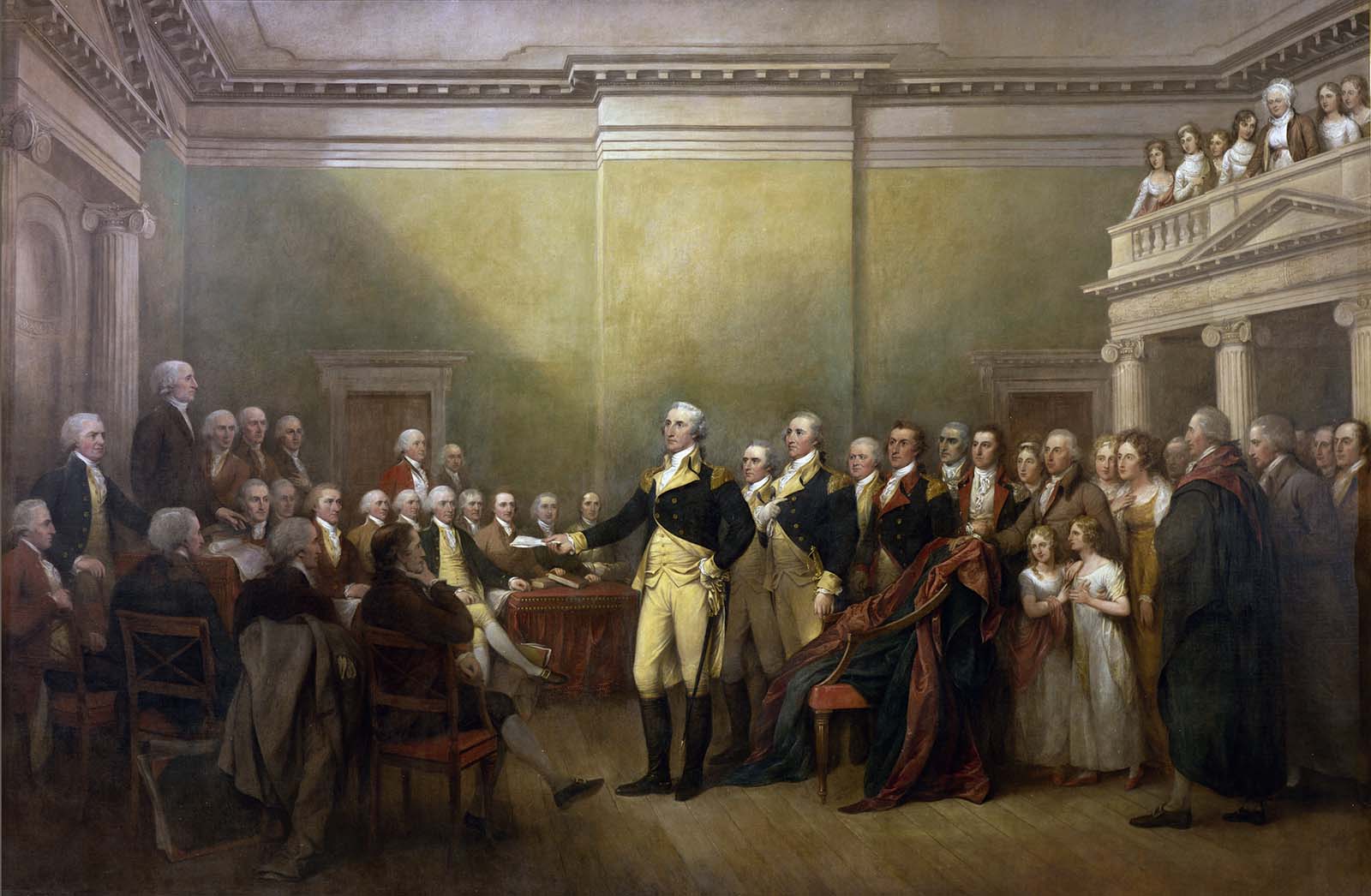<< Hide Menu
3.6 The Influence of Revolutionary Ideals
3 min read•june 18, 2024
James Glackin
Jillian Holbrook
James Glackin
Jillian Holbrook
Domestic Impact of the American Revolution

Another John Trumbull piece commissioned for the Capitol in 1817, this painting depicts what would be remembered as the moment the new United States became a republic. On December 23, 1783, George Washington, widely considered the hero of the Revolution, resigned his position as the most powerful man in the former thirteen colonies. Giving up his role as Commander-in-Chief of the Army insured that civilian rule would define the new nation, and that a republic would be set in place rather than a dictatorship. John Trumbull, General George Washington Resigning His Commission, c. 1817-1824. From the Architect of the Capitol.
The American Revolution had a dramatic impact on different groups of people in America and their perceptions of inequality. Women’s rights, slavery, democracy, equality, and freedom of religion were all important ideas during and after the revolution.
The Declaration of Independence stated that “all men were created equal.” What about the women? Abigail Adams, the wife of President John Adams, was a noted advocate for women in this period, writing to him to "remember the ladies."
Most women of the American Revolution still did traditional domestic work. “Republican Motherhood” evolved as a consequence of the Revolution. Republicanism meant that one should be a good citizen and be civic-minded. Women could fulfill this duty by being good mothers to their children and taking responsibility to instill republican principles in the youth of a new country.
Equality was an important concept associated with the Revolution. Colonial society disliked kings, primogeniture laws of inheritance, and the aristocracy. Democracy was the buzzword. However, slavery still ran rampant in the colonies. America was not ready to take on this “peculiar institution” because it would divide a country that just united in a war.
Yet the beginnings of the abolition of slavery were evident in the Revolution. The first antislavery society originated in Philadelphia in 1775 with the Quakers, and other northern colonies went on to abolish slavery.
Religious debates emerged from the Revolution as well, resulting in the separation of church and state. Thomas Jefferson helped to pass the Virginia Statute for Religious Freedom in 1786, which allowed people to worship their own religion of choice.
🎥 Watch: AP US History - Articles of Confederation
Global Impact of the American Revolution 🇺🇸
The ideals of the American Revolution later spread to other regions that would rebel against tyranny and authority. These revolutions took place in France, Haiti, Europe, and Latin America.
During the French Revolution of 1789, the Third Estate of France, or the commoner class, revolted against King Louis XVI's policies and the poverty he created. Similar to the American Revolution, the French Revolutionary leaders issued a guiding document that had clear Enlightenment principles. The Declaration of Rights of Man and of the Citizen sought to guide the French people toward natural rights, equality, and a representative government that derived its authority from the people—establishing a new political order based on democracy.
On the Caribbean island of Haiti, Haitian slaves embraced the ideals of both the American Revolution and the French Revolution in rebelling against their French masters. Under the leadership of Toussaint L’Ouverture, the Haitians achieved freedom from France in 1804. Haiti established equality and citizenship. In a unique moment, leaders redistributed land to the formerly enslaved and free black people as Haiti became the first black-led country in the western hemisphere
Revolutionaries in Latin America led successful rebellions. Simon Bolivar guided a diverse independence movement through Venezuela, Columbia, Ecuador, and Peru. He wrote the Jamaica Letter (1815), which advocated independence for the Latin American nations and identified “Spanish Americans” as a group distinct from the Spaniards back in Europe.

© 2024 Fiveable Inc. All rights reserved.